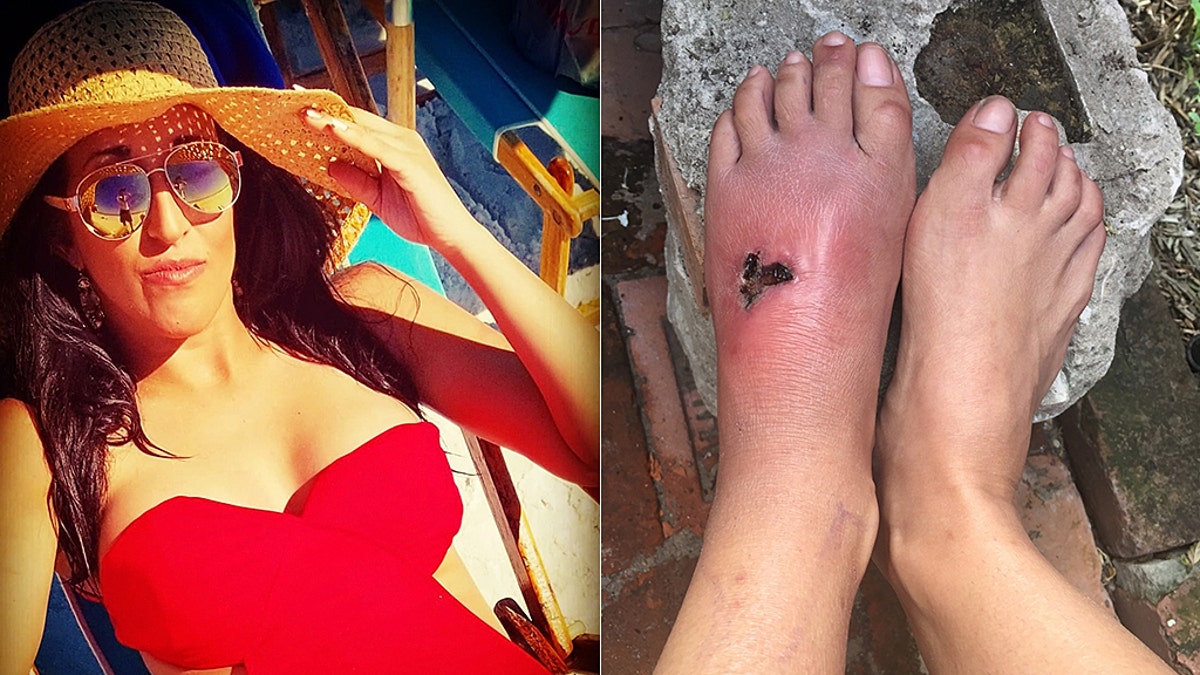
Kelly Kohen, 33, was in shallow water when she felt a pinch on her foot. Days later the wound continued to swell despite receiving antibiotics, and she was diagnosed with flesh-eating bacteria. (PA Real Life)
A paddle in the sea led to a terrifying drama for a female angler after she was bitten by a baby shark, only for the wound to be infected by a flesh-eating bacteria - leaving her in fear of losing her foot.
Kelly Kohen, 33, was wading in the ocean in Louisiana, when she felt a sharp pain in her left foot, quickly prising it free and racing back up the beach, where panic set in when she realized she had been bitten by a baby blacktip shark, common visitors to the area’s coastline.
In agony, especially as the creature had chomped through a major nerve, the self-employed model and motivational speaker, from nearby New Orleans, who had just been fishing with a friend, was rushed to the hospital.
But, despite her swift actions, in the following days, Kohen recalled how her foot continued to swell - with further tests revealing she had the flesh-eating infection necrotizing fasciitis (NF).
“Doctors told me that it was most likely caused by dirty seawater getting into the wound site," she said. “The infection had started spreading up my leg and they warned me that if I didn’t start responding to antibiotics soon, it could mean an amputation."
“I hoped and prayed and, thankfully, I kept my leg," she said. "I feel so lucky to be alive.”
CANCER-STRICKEN BOY GETS DYING WISH TO WALK MOM DOWN AISLE
Kohen recalled how her nightmare began after she went fishing with a pal in May 2016, and afterward went wading in the shallows in front of the crowded beach.
“I went into the water – not particularly far – and felt an animal brush past my leg," she said. "It felt bigger than it should, but I wasn’t sure what it was."
“Next thing I knew, I felt some teeth clamp down on my left foot," she said. "I pulled my leg back and ran up the beach screaming, ‘Oh my god.’ Someone nearby told my friend and I that they’d heard there were blacktip sharks out there. I was really panicking then and trying so hard not to cry, but I was in agony. There was blood everywhere.”
Terrified, Kohen and her friend raced to the hospital and the beach was closed to prevent anybody else from going in the water.
After being examined and given three different types of antibiotics, doctors sent Kohen home but, over the next few days, her foot began to mysteriously swell.
“Eventually, I went back to the hospital, where they told me they were going to admit me,” she said. “I started crying then, as I’d never spent a night in the hospital before."
“Initially, they believed the swelling was down to cellulitis, a type of bacterial skin infection. From speaking to other people who’ve survived NF it sounds as if this is a common misdiagnosis to make," she said. “Nobody I’ve spoken to has had NF diagnosed on first inspection, because it’s so rare, doctors don’t always know what to look out for. It's also incredibly dangerous, so not many people live to tell the tale.”
Kohen was told she did not have cellulitis when her symptoms worsened, although it was still unclear exactly what type of bacteria was causing her agonizing discomfort.
As well as running tests, doctors sent her for debridement surgery, where the dead tissue was cut away, in a bid to stem the infection's progress.
BRITISH TOURIST DIES AFTER CONTRACTING RABIES FROM CAT BITE IN MOROCCO
“They sliced away the tissue and also a spot on my ankle, where they found the infection had started to travel up my leg," she said.
Next, Kohen was fitted with a wound vac to seal off the area and quicken the healing, before having another bout of debridement surgery, followed by a graft, using umbilical tissue to patch up her ravaged foot.
Eventually, medics - including experts from the Centers for Disease Control and Prevention (CDC) - were able to conclude that she had indeed been struck down by a flesh-eating bacteria.
“I couldn’t believe it,” she said. “I had never heard of NF, and didn’t even think flesh-eating bacteria were real.”
Since being released from the hospital, Kohen has worked hard in the gym to regain her strength.
Despite suffering with post-traumatic stress disorder, for which she continues to take medication, she feels thankful to be alive, and hopes by sharing her story, she will raise awareness of deadly NF.
“The first time I went back to the sea after this happened, I completely freaked out. I was overwhelmed with emotion, and couldn’t stop crying," she said. “But I’ve since been back a second time, and felt much calmer. It wasn’t nice to feel creatures around my legs, but after a while, I relaxed more – plus the water was much cleaner, which made me feel safer."
“I want others to be aware of NF, and just how easily it can strike. It was a lot to go through, and a scary time, but now I’m feeling much more positive," she said. “Coming that close to something so serious put life in perspective for me, which I really needed.”
